领导力理论
管理学中的领导力理论解析

管理学中的领导力理论解析领导力在管理学中是一个重要的概念和理论。
它既可以用于个人领导力的发展,也可以应用于组织领导力的建设。
在现代社会中,领导力的重要性越来越被人们所重视。
因为一个强大的领导力,可以推动组织或企业的繁荣发展。
本文将从管理学的角度出发,对领导力理论进行深入解析。
首先,关于领导力的定义,目前尚无一种统一的定义可以被广泛接受。
不过,我们可以从不同的角度对领导力进行理解。
从层面上,领导力可以是个人领导力和组织领导力。
个人领导力是指个人对于自身的行动、想法和工作能力的引领和影响。
而组织领导力则是组织所拥有的影响和控制组织成员行动的能力。
从具体内容上,领导力包括领导人对于组织中的目标、制度、策略和人员等资源的管理。
其次,领导力的来源也是多方面的。
领导力源于领导人的素质和经验,其涵盖了知识、技能和态度三个方面。
在个人素质方面,领导人需要扎实的业务知识、市场、政策等方面的信息,并且需要有创新、思维敏捷、学习能力强的特点。
在技能方面,领导人要具备便捷的沟通技能、企业管理技能、协商谈判技能和问题解决技能。
在态度方面,领导人必须有责任心、行动力、坚定的意志和尊重他人的态度等优秀品质。
第三,领导力的类型和风格也各不相同,主要有传统领导型、服务型领导、魅力型领导和变革型领导等。
传统领导型注重命令、控制和管理,魅力型领导则是通过亲和力及个人魅力进行推动。
服务型领导则更关注于服务他人,而变革型领导则是更注重组织的改革和变革。
每个类型的领导都有其适用的场景和优缺点,因此,领导者需要根据不同的情境和目标来灵活地选择领导风格。
最后,在领导力理论的应用中,还需要考虑到人与组织的关系。
领导力并不是孤立存在的,它和组织的文化、价值观和氛围密切相关。
领导者需要了解和塑造组织与人的关系,从而更有力地推动个人领导力和组织领导力的发展。
此外,在团队建设中,领导者需要关注团队成员的参与、协作和发展,从而形成更加强大的领导力。
总之,领导力理论的研究和实践始终是管理学中的一个重要课题。
领导力理论与领导行为
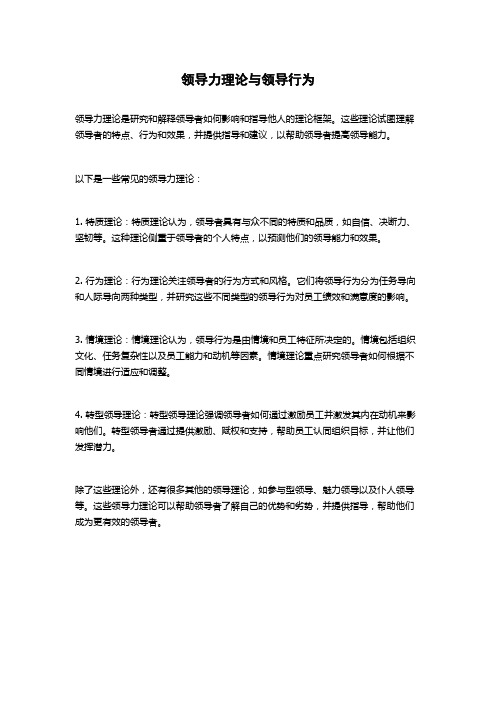
领导力理论与领导行为
领导力理论是研究和解释领导者如何影响和指导他人的理论框架。
这些理论试图理解领导者的特点、行为和效果,并提供指导和建议,以帮助领导者提高领导能力。
以下是一些常见的领导力理论:
1. 特质理论:特质理论认为,领导者具有与众不同的特质和品质,如自信、决断力、坚韧等。
这种理论侧重于领导者的个人特点,以预测他们的领导能力和效果。
2. 行为理论:行为理论关注领导者的行为方式和风格。
它们将领导行为分为任务导向和人际导向两种类型,并研究这些不同类型的领导行为对员工绩效和满意度的影响。
3. 情境理论:情境理论认为,领导行为是由情境和员工特征所决定的。
情境包括组织文化、任务复杂性以及员工能力和动机等因素。
情境理论重点研究领导者如何根据不同情境进行适应和调整。
4. 转型领导理论:转型领导理论强调领导者如何通过激励员工并激发其内在动机来影响他们。
转型领导者通过提供激励、赋权和支持,帮助员工认同组织目标,并让他们发挥潜力。
除了这些理论外,还有很多其他的领导理论,如参与型领导、魅力领导以及仆人领导等。
这些领导力理论可以帮助领导者了解自己的优势和劣势,并提供指导,帮助他们成为更有效的领导者。
企业领导力的基本理论
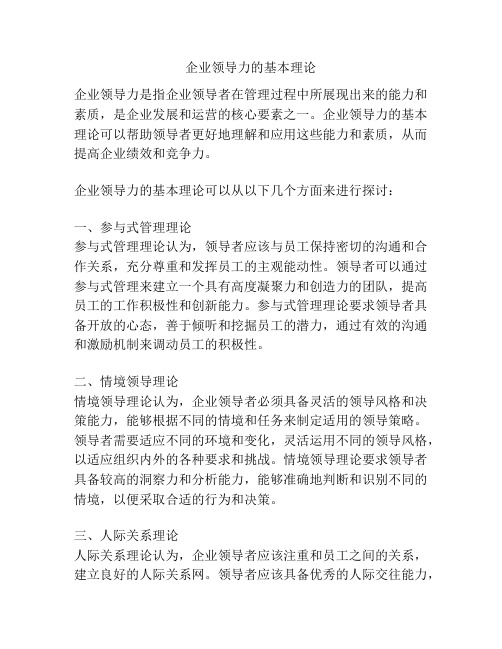
企业领导力的基本理论企业领导力是指企业领导者在管理过程中所展现出来的能力和素质,是企业发展和运营的核心要素之一。
企业领导力的基本理论可以帮助领导者更好地理解和应用这些能力和素质,从而提高企业绩效和竞争力。
企业领导力的基本理论可以从以下几个方面来进行探讨:一、参与式管理理论参与式管理理论认为,领导者应该与员工保持密切的沟通和合作关系,充分尊重和发挥员工的主观能动性。
领导者可以通过参与式管理来建立一个具有高度凝聚力和创造力的团队,提高员工的工作积极性和创新能力。
参与式管理理论要求领导者具备开放的心态,善于倾听和挖掘员工的潜力,通过有效的沟通和激励机制来调动员工的积极性。
二、情境领导理论情境领导理论认为,企业领导者必须具备灵活的领导风格和决策能力,能够根据不同的情境和任务来制定适用的领导策略。
领导者需要适应不同的环境和变化,灵活运用不同的领导风格,以适应组织内外的各种要求和挑战。
情境领导理论要求领导者具备较高的洞察力和分析能力,能够准确地判断和识别不同的情境,以便采取合适的行为和决策。
三、人际关系理论人际关系理论认为,企业领导者应该注重和员工之间的关系,建立良好的人际关系网。
领导者应该具备优秀的人际交往能力,能够与员工建立良好的信任和沟通关系,使员工对领导者有较高的认同感和归属感。
人际关系理论要求领导者具备良好的情商和团队建设能力,能够正确处理和解决员工之间的冲突和合作问题,以便提高团队的协作效率和凝聚力。
四、道德领导理论道德领导理论认为,企业领导者应该具备良好的道德品质和道德操守,为员工树立良好的榜样。
领导者应该以身作则,坚持正直和诚信的原则,秉持正确的价值观和道德底线。
道德领导理论要求领导者具备远见和责任感,能够为组织和员工的长远发展着想,不以短期利益为重,而是以全局和长远的利益为导向。
企业领导力的基本理论不仅仅是一种学术理论,更是一种实践指导。
企业领导者可以通过学习和运用这些理论,提高自己的领导能力和素质,实现企业的快速发展和持续增长。
领导力理论研究

领导力理论研究关于领导力理论研究的文献综述一、引言领导力在领导系统中是一个根本性、战略性的范畴,是领导者凭借其个人素质的综合作用在一定条件下对特定个人或组织所产生的人格凝聚力和感召力,是保持组织卓越成长和可持续发展的重要驱动力。
当今时代,领导力已经成为综合领导能力不可缺少的构成因素之一。
鉴于领导力对组织产生的巨大影响力,各国研究者对于领导力进行了大量的研究,产生了多种领导力理论。
本文对文献的综述基本上从不同的领导力理论展开,第二部分介绍了中西领导力的区别与联系,第三部分介绍了不同领导力的提升方式。
二、不同的领导力理论㈠变革型和交易型领导力变革型领导力具有强适应性,高可塑性,强灵活性等特点,它能够使团队及企业在快速变化、具有高不确定性的经济环境中更高效地生存与发展。
虽然变革型一交易型领导力的研究已经开展了20多年。
但在概念,结构,研究方法,研究方向各方面都存在一定的局限性和有待发展的窄间。
杨凯,马剑虹对变革型和交易型领导力研究进行了归纳与评价。
首先,杨凯,马剑虹对变革型—交易型领导力的概念及定义进行了阐述,杨凯,马剑虹认为变革型—交易型领导力并不属于领导行为理论,因为变革型领导力中最核心的一项—魅力领导,是很难用行为来描述的,很难通过培训来进行显著改善。
变革型一交易型领导力是一种对于领导力的有效分类,它通过对领导的风格,上下级问的互动模式等方面的不同进行了分类,它其实包括了以上三种理论的全部,与特质理论、行为理论或权变理论不在同一个维度上。
杨凯,马剑虹从研究思路的角度总结以往领域的研究,认为变革型—交易型领导力研究可分为四类:变革型—交易型领导力的有效性比较,“输入—过程—输出”范式研究,领导—员工—任务情景匹配研究,变革型—交易型领导力的预测因子研究。
变革型领导力的组成结构由Bass等人大量的定性分析(访谈)和定量分析(因素分析)而得出并制成“多因素领导力问卷”(MLQ)。
它包含了变革型领导力和交易型领导力各个维度的评定项目。
管理学中的领导力理论与实践
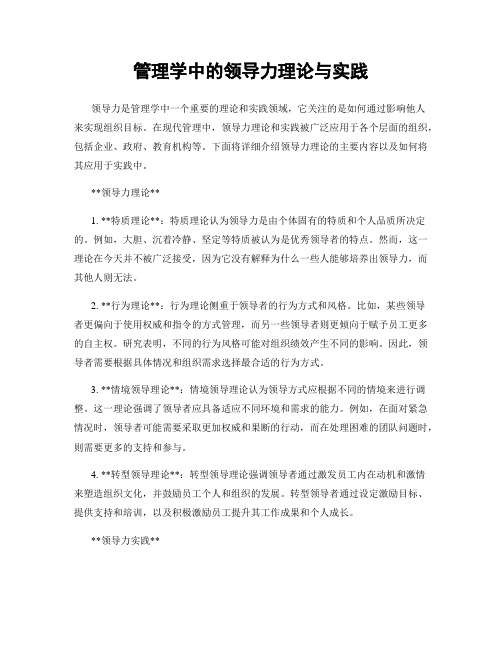
管理学中的领导力理论与实践领导力是管理学中一个重要的理论和实践领域,它关注的是如何通过影响他人来实现组织目标。
在现代管理中,领导力理论和实践被广泛应用于各个层面的组织,包括企业、政府、教育机构等。
下面将详细介绍领导力理论的主要内容以及如何将其应用于实践中。
**领导力理论**1. **特质理论**:特质理论认为领导力是由个体固有的特质和个人品质所决定的。
例如,大胆、沉着冷静、坚定等特质被认为是优秀领导者的特点。
然而,这一理论在今天并不被广泛接受,因为它没有解释为什么一些人能够培养出领导力,而其他人则无法。
2. **行为理论**:行为理论侧重于领导者的行为方式和风格。
比如,某些领导者更偏向于使用权威和指令的方式管理,而另一些领导者则更倾向于赋予员工更多的自主权。
研究表明,不同的行为风格可能对组织绩效产生不同的影响。
因此,领导者需要根据具体情况和组织需求选择最合适的行为方式。
3. **情境领导理论**:情境领导理论认为领导方式应根据不同的情境来进行调整。
这一理论强调了领导者应具备适应不同环境和需求的能力。
例如,在面对紧急情况时,领导者可能需要采取更加权威和果断的行动,而在处理困难的团队问题时,则需要更多的支持和参与。
4. **转型领导理论**:转型领导理论强调领导者通过激发员工内在动机和激情来塑造组织文化,并鼓励员工个人和组织的发展。
转型领导者通过设定激励目标、提供支持和培训,以及积极激励员工提升其工作成果和个人成长。
**领导力实践**1. **建立明确的愿景和目标**:作为领导者,首要任务是确定组织的使命和愿景,并将其传达给团队成员。
领导者应该明确组织的目标,并与团队一起制定具体的行动计划,以确保实现这些目标。
2. **发挥团队成员的潜力**:领导者应该认识到每个团队成员的能力和潜力,并努力发挥他们的优势。
通过了解每个成员的兴趣、技能和动机,领导者可以将团队成员放置在最适合他们的项目和职责上,从而提高整个团队的绩效。
领导力之五力模型概述
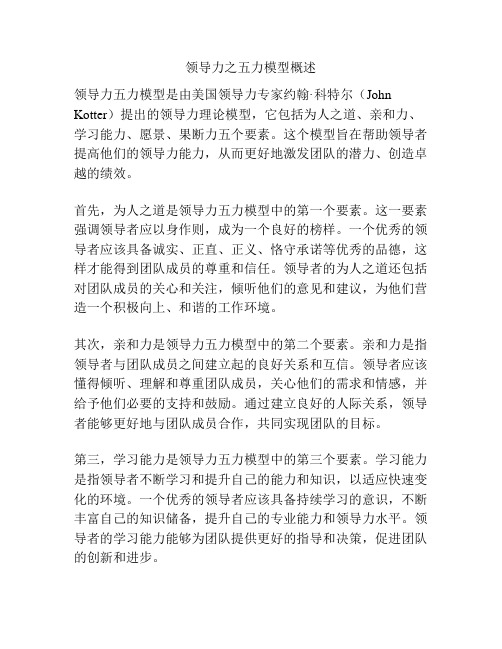
领导力之五力模型概述领导力五力模型是由美国领导力专家约翰·科特尔(John Kotter)提出的领导力理论模型,它包括为人之道、亲和力、学习能力、愿景、果断力五个要素。
这个模型旨在帮助领导者提高他们的领导力能力,从而更好地激发团队的潜力、创造卓越的绩效。
首先,为人之道是领导力五力模型中的第一个要素。
这一要素强调领导者应以身作则,成为一个良好的榜样。
一个优秀的领导者应该具备诚实、正直、正义、恪守承诺等优秀的品德,这样才能得到团队成员的尊重和信任。
领导者的为人之道还包括对团队成员的关心和关注,倾听他们的意见和建议,为他们营造一个积极向上、和谐的工作环境。
其次,亲和力是领导力五力模型中的第二个要素。
亲和力是指领导者与团队成员之间建立起的良好关系和互信。
领导者应该懂得倾听、理解和尊重团队成员,关心他们的需求和情感,并给予他们必要的支持和鼓励。
通过建立良好的人际关系,领导者能够更好地与团队成员合作,共同实现团队的目标。
第三,学习能力是领导力五力模型中的第三个要素。
学习能力是指领导者不断学习和提升自己的能力和知识,以适应快速变化的环境。
一个优秀的领导者应该具备持续学习的意识,不断丰富自己的知识储备,提升自己的专业能力和领导力水平。
领导者的学习能力能够为团队提供更好的指导和决策,促进团队的创新和进步。
第四,愿景是领导力五力模型中的第四个要素。
愿景是指领导者能够清晰地看到未来的方向和目标,并能够激励团队成员为之努力奋斗。
一个优秀的领导者应该能够为团队绘制一个远见卓识的愿景,并能够准确地传达和推行这个愿景。
领导者的愿景能够激发团队成员的潜力和积极性,使团队朝着共同的目标努力。
最后,果断力是领导力五力模型中的第五个要素。
果断力是指领导者在面对困难和压力时能够果断地作出决策和行动。
一个优秀的领导者应该具备坚定的决心和勇气,能够迅速做出正确的决策,并能够鼓舞团队成员积极应对挑战。
领导者的果断力能够提高团队的执行效率和团队的应变能力,使团队能够更好地应对各种变化和挑战。
当代领导力理论及其在企业管理中的应用
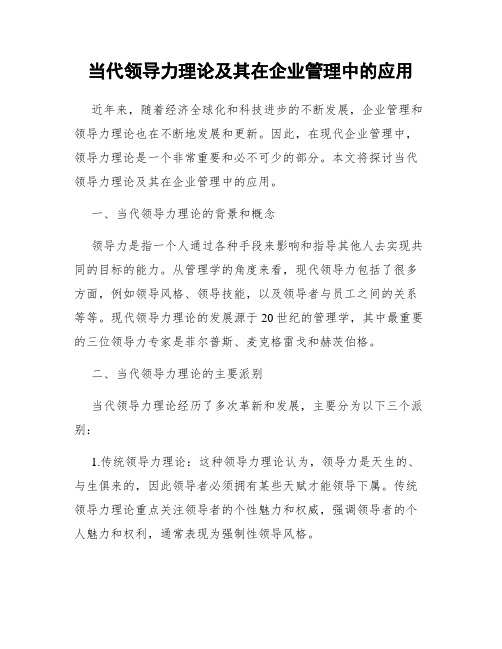
当代领导力理论及其在企业管理中的应用近年来,随着经济全球化和科技进步的不断发展,企业管理和领导力理论也在不断地发展和更新。
因此,在现代企业管理中,领导力理论是一个非常重要和必不可少的部分。
本文将探讨当代领导力理论及其在企业管理中的应用。
一、当代领导力理论的背景和概念领导力是指一个人通过各种手段来影响和指导其他人去实现共同的目标的能力。
从管理学的角度来看,现代领导力包括了很多方面,例如领导风格、领导技能,以及领导者与员工之间的关系等等。
现代领导力理论的发展源于20世纪的管理学,其中最重要的三位领导力专家是菲尔普斯、麦克格雷戈和赫茨伯格。
二、当代领导力理论的主要派别当代领导力理论经历了多次革新和发展,主要分为以下三个派别:1.传统领导力理论:这种领导力理论认为,领导力是天生的、与生俱来的,因此领导者必须拥有某些天赋才能领导下属。
传统领导力理论重点关注领导者的个性魅力和权威,强调领导者的个人魅力和权利,通常表现为强制性领导风格。
2.情境领导力理论:情境领导力理论认为,领导力是与环境有关的,领导者必须根据不同的情境来选择不同的领导风格。
如在紧急情况下,需要直接干预解决问题的领导风格,而在员工自我管理能力强的情况下,只需要提供指引和支持。
3.变革型领导力理论:在当今的企业环境中,变革型领导力理论得到越来越广泛的应用。
这种领导力理论重点关注领导者的愿景和智慧,强调领导者如何通过改变自己和组织,来适应复杂的商业环境,使企业更具竞争力。
三、如何应用领导力理论在企业管理中1.建立团队文化:企业的成功离不开一个团结、合作的团队。
领导者可以通过塑造企业文化来促进员工之间的互动和互信,使之形成协同合作的态势。
2.塑造领导风格:领导者需要根据自己的个性和企业的需求,选择适合自己的领导风格。
不应与他人去比较和模仿,应建立自己的风格,并在实践中不断总结和改进。
3.提高员工士气:领导者需要给予员工足够的信任和支持,让员工感受到他们的工作正在被重视,并强化对员工的激励机制,从而提高员工的士气和工作动力。
领导力的五个模型
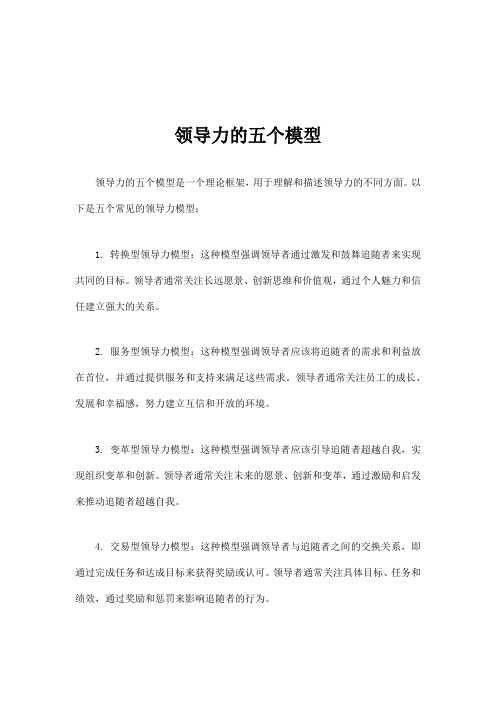
领导力的五个模型
领导力的五个模型是一个理论框架,用于理解和描述领导力的不同方面。
以下是五个常见的领导力模型:
1. 转换型领导力模型:这种模型强调领导者通过激发和鼓舞追随者来实现共同的目标。
领导者通常关注长远愿景、创新思维和价值观,通过个人魅力和信任建立强大的关系。
2. 服务型领导力模型:这种模型强调领导者应该将追随者的需求和利益放在首位,并通过提供服务和支持来满足这些需求。
领导者通常关注员工的成长、发展和幸福感,努力建立互信和开放的环境。
3. 变革型领导力模型:这种模型强调领导者应该引导追随者超越自我,实现组织变革和创新。
领导者通常关注未来的愿景、创新和变革,通过激励和启发来推动追随者超越自我。
4. 交易型领导力模型:这种模型强调领导者与追随者之间的交换关系,即通过完成任务和达成目标来获得奖励或认可。
领导者通常关注具体目标、任务和绩效,通过奖励和惩罚来影响追随者的行为。
5. 共享型领导力模型:这种模型强调领导者与追随者之间的共同决策和合作,即通过集体智慧和协作来达成共同的目标。
领导者通常关注团队的协作、共同价值观和目标,通过建立团队文化和促进对话来促进集体行动。
以上五种领导力模型各有特点,但都是为了提高领导者的素质和能力,以更好地影响追随者并实现共同的目标。
在实际应用中,领导者可以根据组织文化、情境和任务选择适合的领导力模型,以更好地发挥领导作用。
领导力理论在实际工作中的成功案例

领导力理论在实际工作中的成功案例近年来,领导力理论在实际工作中发挥着越来越重要的作用。
领导力不仅仅是指领导者的个人能力,更是一种组织中的文化和价值观。
在现代商业环境中,一个具备良好领导力的团队可以更好地适应变化,并取得成功。
本文将通过几个成功案例来探讨领导力理论在实际工作中的重要性。
第一个成功案例是乔布斯的领导力。
乔布斯是苹果公司的创始人之一,也是一个极具争议性的领导者。
然而,他的领导力无疑对苹果公司的成功起到了重要作用。
乔布斯具备强烈的愿景和目标,并能够激发团队成员的激情。
他的领导风格以创新、激情和完美主义为特点,着重于产品的设计和用户体验。
乔布斯的领导力魅力使得苹果公司在全球范围内取得了巨大成功,成为了全球最有价值的公司之一。
第二个成功案例是亚马逊的领导力。
亚马逊是全球最大的电子商务公司之一,其创始人贝索斯的领导力向世人展示了一个追求卓越的企业的榜样。
贝索斯以勇气、决心和长远眼光闻名,他不断推动亚马逊公司进步并超越竞争对手。
他注重团队文化的建设,鼓励员工追求创新和不断学习,并确保每个员工都能发挥其最大潜力。
贝索斯的领导风格有效地激励了团队成员,使亚马逊成为了全球最受欢迎的电子商务网站之一。
第三个成功案例是谷歌的领导力。
谷歌是一家全球性的科技巨头,其创始人拉里·佩奇和谢尔盖·布林领导下的谷歌团队取得了非凡的成就。
拉里和谢尔盖以开放、灵活和创新的领导风格著称。
他们鼓励员工提出新想法,并支持他们实现这些想法。
谷歌的企业文化强调员工的自由与创造力,这为公司的产品和服务带来了巨大的创新力。
谷歌的成功不仅仅在于技术上的突破,更在于其团队的优秀领导力和文化氛围。
最后一个成功案例是杰克·韦尔奇的领导力。
杰克·韦尔奇是通用电气公司(GE)的前首席执行官,他被公认为是现代管理思想中的领袖之一。
韦尔奇通过强调员工的激励和发展来改变通用电气的文化,他实施了一系列的管理创新,例如业务组合分析和“6西格玛”质量管理方法。
领导力的不同理论与模型
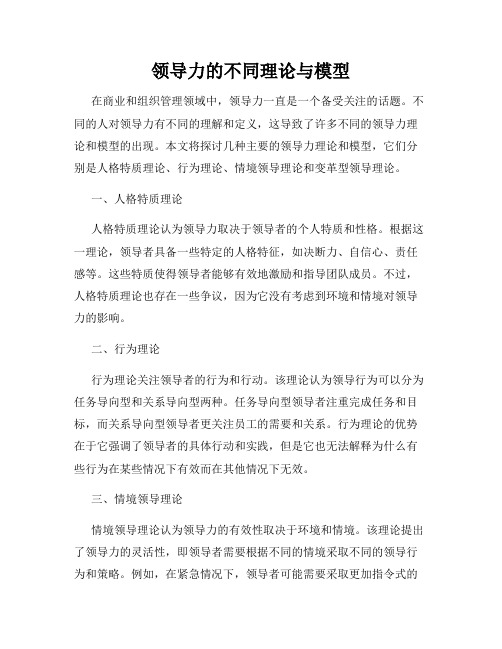
领导力的不同理论与模型在商业和组织管理领域中,领导力一直是一个备受关注的话题。
不同的人对领导力有不同的理解和定义,这导致了许多不同的领导力理论和模型的出现。
本文将探讨几种主要的领导力理论和模型,它们分别是人格特质理论、行为理论、情境领导理论和变革型领导理论。
一、人格特质理论人格特质理论认为领导力取决于领导者的个人特质和性格。
根据这一理论,领导者具备一些特定的人格特征,如决断力、自信心、责任感等。
这些特质使得领导者能够有效地激励和指导团队成员。
不过,人格特质理论也存在一些争议,因为它没有考虑到环境和情境对领导力的影响。
二、行为理论行为理论关注领导者的行为和行动。
该理论认为领导行为可以分为任务导向型和关系导向型两种。
任务导向型领导者注重完成任务和目标,而关系导向型领导者更关注员工的需要和关系。
行为理论的优势在于它强调了领导者的具体行动和实践,但是它也无法解释为什么有些行为在某些情况下有效而在其他情况下无效。
三、情境领导理论情境领导理论认为领导力的有效性取决于环境和情境。
该理论提出了领导力的灵活性,即领导者需要根据不同的情境采取不同的领导行为和策略。
例如,在紧急情况下,领导者可能需要采取更加指令式的行为,而在创新性任务中,领导者可能需要更加开放和支持性。
情境领导理论的优势在于它考虑到了环境的复杂性和多样性,但是它也存在着将领导力归因于情境的局限性。
四、变革型领导理论变革型领导理论强调领导者通过激发员工内在动机和激情来实现组织的变革和发展。
变革型领导者通过提供愿景、激励员工并促进创新来带领组织取得成功。
这种领导理论强调领导者的情感智慧、激励技能和影响力,以及他们与员工之间的积极互动和合作。
变革型领导理论被认为是一种积极的领导模型,在现代组织管理中越来越受到重视。
综上所述,领导力的不同理论和模型提供了不同的视角和方法来理解和培养领导能力。
虽然每种理论和模型都有其优势和局限性,但它们共同揭示了领导力的复杂性和多样性。
领导力理论的新发展与趋势

领导力理论的新发展与趋势领导力理论是一个不断演变的概念,随着社会和组织环境的变化,领导力理论也在不断发展和演变。
从传统领导模式到现代领导理论的不断创新,领导力理论的新发展与趋势呈现出以下几个重要方面:1. 转型领导理论:随着组织环境的快速变化和全球化趋势的加剧,传统的指令式领导已经不能适应当今复杂多变的组织环境。
转型领导理论强调领导者需要具备适应性和变革能力,能够引领组织迎接挑战和变革,塑造具有弹性和创新力的组织文化。
2. 情绪智商领导:情绪智商在领导力理论中的地位越来越受到重视。
领导者要善于管理自己和员工的情绪,激发团队的积极情绪和创造力,构建良好的工作氛围和团队关系。
情绪智商领导理论要求领导者具备情绪认知、情绪管理和情绪运用的能力,从而实现组织的高效运作和员工的发展壮大。
3. 服务型领导:传统领导模式中,领导者往往处于权威地位,指挥下属完成任务。
而服务型领导理论强调领导者应该将下属的需求和发展放在首位,成为服务下属的“仆人领导者”,关注下属的成长和发展,激励他们实现个人和组织的共同目标。
服务型领导理论通过倡导共情、支持和赋权的方式,实现员工的自主性和团队的合作性,提升整个组织的绩效和创造力。
4. 共同领导模式:共同领导是一种基于合作和共享的领导模式,强调领导力不应该仅仅局限于一个领导者,而是应该由团队中的不同成员共同承担。
共同领导模式颠覆了传统的单一领导者模式,强调团队合作和多元化的智慧能够带来更好的决策和创新。
共同领导模式鼓励团队成员间的相互信任和协作,实现组织战略目标和员工的发展共赢。
5. 整合性领导力:整合性领导力理论强调领导者需要具备多方面的领导能力和品质,包括情商、智商、道德品质、沟通技巧等多个方面。
整合性领导者能够综合运用各类领导技能,根据不同情况和不同需求进行灵活调整,实现领导目标的最大化和全面性发展。
整合性领导力理论要求领导者不仅具备专业知识和技能,更要具备全面的人格魅力和影响力,成为组织中的灵魂人物。
管理学中的领导力理论研究
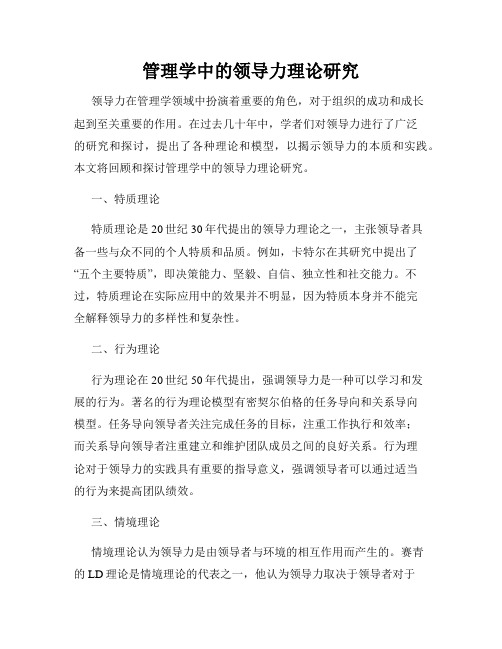
管理学中的领导力理论研究领导力在管理学领域中扮演着重要的角色,对于组织的成功和成长起到至关重要的作用。
在过去几十年中,学者们对领导力进行了广泛的研究和探讨,提出了各种理论和模型,以揭示领导力的本质和实践。
本文将回顾和探讨管理学中的领导力理论研究。
一、特质理论特质理论是20世纪30年代提出的领导力理论之一,主张领导者具备一些与众不同的个人特质和品质。
例如,卡特尔在其研究中提出了“五个主要特质”,即决策能力、坚毅、自信、独立性和社交能力。
不过,特质理论在实际应用中的效果并不明显,因为特质本身并不能完全解释领导力的多样性和复杂性。
二、行为理论行为理论在20世纪50年代提出,强调领导力是一种可以学习和发展的行为。
著名的行为理论模型有密契尔伯格的任务导向和关系导向模型。
任务导向领导者关注完成任务的目标,注重工作执行和效率;而关系导向领导者注重建立和维护团队成员之间的良好关系。
行为理论对于领导力的实践具有重要的指导意义,强调领导者可以通过适当的行为来提高团队绩效。
三、情境理论情境理论认为领导力是由领导者与环境的相互作用而产生的。
赛青的LD理论是情境理论的代表之一,他认为领导力取决于领导者对于“任务属性”和“领导者-追随者关系”两个因素的解释和应对。
根据任务属性的不同,领导者需要选择不同的领导风格,来适应任务的需求。
同时,领导者与追随者之间的关系也对领导力的发挥起到重要的影响。
四、变革理论变革理论也被称为变革型领导力理论,主张领导者通过改变和创新来影响组织和团队。
柯恩与埃德勒提出的变革型领导力模型认为领导者需要具备鉴定、挑战和发展追随者的能力,以激发他们的创造力和潜力。
变革型领导力理论强调领导者的影响力扩展到了组织文化和价值观的凝聚,对于组织发展和创新至关重要。
五、情感智能理论情感智能理论是21世纪提出的领导力理论之一,强调领导者的情商对于领导力的发挥至关重要。
戈尔曼等学者提出的五个情感智能维度(情绪意识、情绪管理、自我激励、社交意识、关系管理)对于领导者的有效沟通、情感辅导和情绪调节具有重要意义。
心理学中的领导力理论

心理学中的领导力理论领导力是指一个人在组织中激发、引导团队成员,达成共同目标的能力。
在许多领域,领导力都被作为一个重要的研究领域。
心理学在研究领导力方面做出了巨大贡献。
本文将介绍心理学中的领导力理论。
1. 特质理论特质理论认为,领导力的产生通过领导者本身的心理特质或性格特质。
这种理论认为领导者是一些天生的,优秀的人,其心理和行为优势使他们成为了领袖。
在这种理论中,领导者被认为具有一些特殊性格、态度和行为特征。
2. 行为理论行为理论认为,领导并不是天赋人物,而是通过学习和经验获得的一个技能。
这种理论认为,领导力是通过特定的行为表现而实现的。
行为理论强调了领导者的行为方式,例如他们如何激励员工、建立关系等。
3. 情境理论情境理论认为,在不同的情境下,最佳的领导风格也不同。
这种理论认为,领导者在不同环境下的行为应该根据员工的需要和背景以及任务需求来调整。
情境理论重视了领导者和员工之间的互动,和员工的需求和期望。
4. 路径-目标理论路径-目标理论是一种基于行为理论的领导力理论。
路-目标理论认为,领导者必须设计路径,指引员工完成目标。
这种理论试图为领导者提供一种指导员工成功完成任务的方法。
路径-目标理论认为,领导者可以通过制定清晰的目标,并提供适当的支持和激励,来提升员工创造力和表现。
5. 转变型领导理论转变型领导理论认为,领导者应该关注员工的个人成长和发展,以及组织的长期成功。
这种领导风格试图通过激发员工的积极性和动力来提高员工的生产力和表现。
转变型领导者试图让员工参与组织和决策过程,以激发他们的创造力和动力。
6. 依恋型领导理论依恋型领导理论关注的是领导者和员工之间的关系,并认为这种关系对员工行为和表现产生影响。
依恋型领导理论认为领导者可以通过建立亲密的关系,提供有效的支持和鼓励,以增强员工的表现和承诺。
结论心理学中的领导力理论提供了多种不同的方式来理解领导者如何影响员工和组织成功。
这些理论中的每一种都强调了领导者在组织生态系统中的重要性,以及如何通过改进领导者和员工之间的关系来提高生产力和创造力。
领导力理论对组织绩效的影响

领导力理论对组织绩效的影响引言:领导力一直被认为是组织成功的重要关键之一。
领导力理论是对领导者如何影响组织成员以实现共同目标的研究和解释。
有效的领导力可以提高组织绩效,激发员工的工作热情和积极性。
本文将探讨领导力理论对组织绩效的影响,并分析其中的机制。
一、变革型领导力1. 变革型领导力的概念变革型领导力是指一种能够激发员工内在动力、鼓励创新和变革的领导风格。
变革型领导者通常具有魅力和说服力,能够影响员工的价值观和信念,并能够激发团队成员的潜力。
2. 变革型领导力对组织绩效的影响变革型领导力对组织绩效有积极影响。
首先,变革型领导者能够推动组织的创新和变革,促进组织的持续发展和竞争力的提高。
其次,变革型领导者能够激发员工的工作热情和积极性,增强员工的工作满意度和承诺感。
这些因素都有助于提高组织的绩效。
二、交换型领导力1. 交换型领导力的概念交换型领导力是指领导者与组织成员之间进行的一种以互惠交换为基础的关系。
领导者通过给予员工资源、支持和机会来获得员工的忠诚和效忠。
2. 交换型领导力对组织绩效的影响交换型领导力对组织绩效有积极影响。
首先,通过互惠交换关系,员工会感到被重视和认可,从而提高工作动力和效能。
其次,交换型领导者能够建立起良好的员工关系,减少员工的离职率,提高员工的保持度。
这对于组织来说具有重要意义。
三、道德型领导力1. 道德型领导力的概念道德型领导力是指领导者通过言传身教,以身作则来引领组织成员进行道德行为,关注员工的福祉和人性化管理。
2. 道德型领导力对组织绩效的影响道德型领导力对组织绩效有积极影响。
首先,道德型领导者能够塑造组织的道德氛围,促进员工的道德判断和行为规范。
其次,道德型领导者能够建立起高度信任的工作环境,减少内部纠纷和不道德行为。
这对于组织的可持续发展和声誉有着重要影响。
结论:领导力理论对组织绩效有着显著的影响。
变革型、交换型和道德型领导力都能够提高组织的绩效,激发员工的工作积极性和创新能力。
领导力发展历程及主要理论

决策能力,即依
2 赖事实而非想象 进行决策,具有 高瞻远瞩的能力。
善于应变,即机
5 动灵活,善于进 取,而不抱守缺、 墨守成规。
组织能力,即能
3 发掘部属的才能, 善于组织人力、 物力和财力。
1
敢于求新,即对新事物、新环境和新观念有敏锐的感受能力。
2
ቤተ መጻሕፍቲ ባይዱ
勇于负责,即对上级、下级的产品用户及整个社会抱有高度的责任心。
02
与工作有关的特性。 有些特性已经被证明 具有积极的结果。
03
社交特性。研究表明, 成功的领导者具有善 交际、广交游、各级 参加各种活动、愿意 与人合作等特点
包莫尔的领导 特质论
合作精神,即愿 与他人一起工作,
1 能赢得人们的合 作,对人不是压 服,而是感动和 说服。
精于授权,即能
4 大权独揽,小权 分散。
Major Leadership Traits
智能(Intelligence) 自信心(self-confidence) 毅力(Determination) 正直诚实(Integrity) 社交力(Sociability)
领导力四要素 洞察力 凝聚力 推进力 决断力
斯托格蒂尔的 六类领导特质
身份特性,如精力、 身高、外貌等。这 方面迄今的发现还 是很矛盾的,不足 以服人。
01 领导特质理论充满生机 与活力。
02 开端:强调对伟人特性 的辨识;
03 中段:转向环境对领导 力的影响;
04 近期:强调领导特质对 高效能领导力的关 键作 用
表2.1 领导特质研究
Stogdill(1 948)
Mann(1959)
Stogdill(1 974)
Lord, Devader, & Alliger(1986)
管理学中的领导力理论
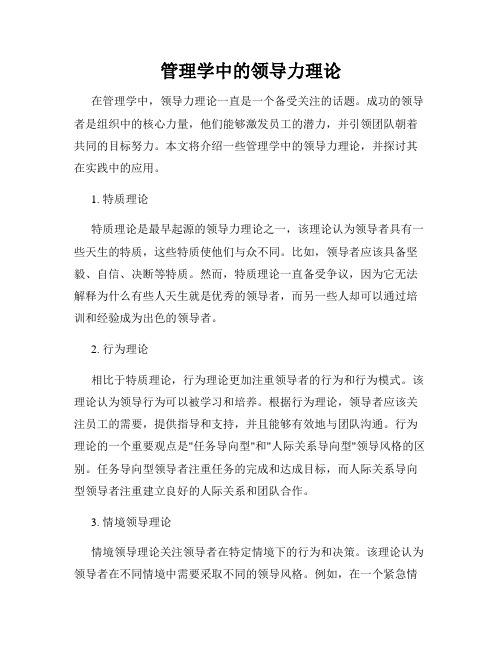
管理学中的领导力理论在管理学中,领导力理论一直是一个备受关注的话题。
成功的领导者是组织中的核心力量,他们能够激发员工的潜力,并引领团队朝着共同的目标努力。
本文将介绍一些管理学中的领导力理论,并探讨其在实践中的应用。
1. 特质理论特质理论是最早起源的领导力理论之一,该理论认为领导者具有一些天生的特质,这些特质使他们与众不同。
比如,领导者应该具备坚毅、自信、决断等特质。
然而,特质理论一直备受争议,因为它无法解释为什么有些人天生就是优秀的领导者,而另一些人却可以通过培训和经验成为出色的领导者。
2. 行为理论相比于特质理论,行为理论更加注重领导者的行为和行为模式。
该理论认为领导行为可以被学习和培养。
根据行为理论,领导者应该关注员工的需要,提供指导和支持,并且能够有效地与团队沟通。
行为理论的一个重要观点是"任务导向型"和"人际关系导向型"领导风格的区别。
任务导向型领导者注重任务的完成和达成目标,而人际关系导向型领导者注重建立良好的人际关系和团队合作。
3. 情境领导理论情境领导理论关注领导者在特定情境下的行为和决策。
该理论认为领导者在不同情境中需要采取不同的领导风格。
例如,在一个紧急情况下,领导者可能会采取更加"指令型"的领导风格,而在一个团队合作的环境中,领导者则可能更加关注员工的意见和参与。
情境领导理论的核心思想是领导者应该根据情境和员工的需要来调整自己的行为。
4. 力量和影响理论力量和影响理论认为领导者通过他们的权力和影响力来实现组织的目标。
领导者可以通过授予权力和激励员工来影响他们的行为。
该理论强调领导者应该具备良好的沟通能力、说服能力和适应能力。
通过有效地运用这些技巧,领导者能够在组织中获得更大的影响力,从而实现组织的目标。
总结起来,管理学中的领导力理论包括特质理论、行为理论、情境领导理论和力量和影响理论。
每种理论都有其优势和局限性,没有一种理论是完美的。
领导力理论解析成功的领导者需要具备哪些特质
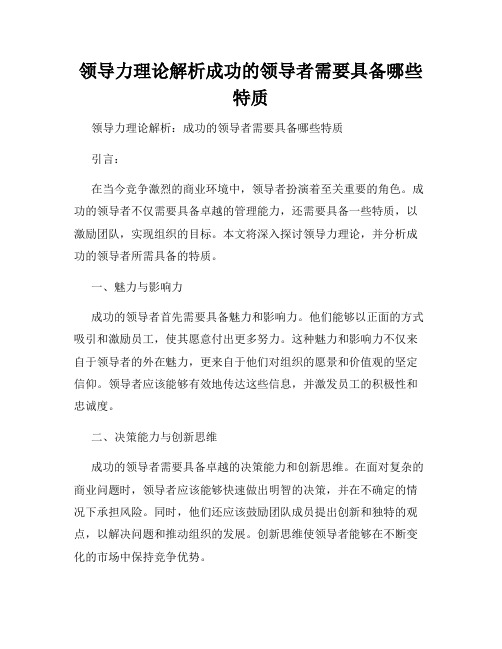
领导力理论解析成功的领导者需要具备哪些特质领导力理论解析:成功的领导者需要具备哪些特质引言:在当今竞争激烈的商业环境中,领导者扮演着至关重要的角色。
成功的领导者不仅需要具备卓越的管理能力,还需要具备一些特质,以激励团队,实现组织的目标。
本文将深入探讨领导力理论,并分析成功的领导者所需具备的特质。
一、魅力与影响力成功的领导者首先需要具备魅力和影响力。
他们能够以正面的方式吸引和激励员工,使其愿意付出更多努力。
这种魅力和影响力不仅来自于领导者的外在魅力,更来自于他们对组织的愿景和价值观的坚定信仰。
领导者应该能够有效地传达这些信息,并激发员工的积极性和忠诚度。
二、决策能力与创新思维成功的领导者需要具备卓越的决策能力和创新思维。
在面对复杂的商业问题时,领导者应该能够快速做出明智的决策,并在不确定的情况下承担风险。
同时,他们还应该鼓励团队成员提出创新和独特的观点,以解决问题和推动组织的发展。
创新思维使领导者能够在不断变化的市场中保持竞争优势。
三、坚韧与逆境应对能力成功的领导者应该具备坚韧的品质和逆境应对能力。
他们能够在挫折和困难面前保持积极的态度,并带领团队度过难关。
领导者应该能够以榜样的力量激励员工,让他们相信团队能够克服一切困难。
坚韧和逆境应对能力是成功的领导者克服挑战,实现组织目标的关键特质。
四、人际关系管理成功的领导者需要具备优秀的人际关系管理能力。
他们能够建立起与团队成员、合作伙伴和其他利益相关者之间的良好关系。
领导者应该能够倾听和理解他人的观点,同时也能够有效地传达并协调不同的意见和利益。
通过建立良好的人际关系,领导者可以增强团队的凝聚力和合作性,从而更好地实现组织的目标。
五、情商和自我意识成功的领导者需要具备高情商和自我意识。
情商使领导者能够更好地理解和管理自己的情绪,并能够与他人建立互信和合作的关系。
自我意识使领导者能够认识自己的优势和不足,并能够寻求和接受反馈,不断提升自己的领导能力。
情商和自我意识是成功的领导者在个人和团队发展中至关重要的特质。
领导力理论对组织发展的影响

领导力理论对组织发展的影响引言:领导力是组织成功的核心关键之一。
随着组织环境复杂性的不断增加,领导者必须具备一定的领导力,以推动组织的发展和创新。
本文将探讨领导力理论对组织发展的影响,并分析领导力在不同阶段的组织中的实践方法。
一、领导力理论及其重要性1.1 赫茨伯格与麦克格雷戈双因素理论赫茨伯格与麦克格雷戈提出了双因素理论,认为领导力可以通过满足员工的基本工作需求以及激发员工内在动机来影响组织发展。
这一理论强调了激励和激发员工工作动力的重要性。
1.2 变革型领导理论变革型领导理论强调领导者在带领组织实现创新和变革方面的重要性。
领导者通过鼓励员工的创造力和激发他们的激情,促进组织的创新发展。
1.3 权变领导理论权变领导理论认为领导者必须灵活适应变化的环境,并根据具体情况采取合适的领导方式。
这一理论强调了领导者的灵活性和应变能力。
二、领导力对组织发展的影响2.1 塑造组织文化领导者通过自身的行为和言行影响组织成员,进而塑造组织的文化氛围。
优秀的领导者能够引导员工具备积极向上的价值观和行为准则,从而促进组织的发展。
2.2 激发员工工作动力领导者的领导风格和行为会直接影响员工的工作动力。
强大的领导力激励员工更高效地完成工作任务,提升组织绩效。
2.3 推动组织创新领导者的创新意识和鼓励创新的氛围对组织发展起着至关重要的作用。
他们鼓励员工提出新的想法和解决方案,推动组织持续创新和改进。
2.4 建立有效的团队领导者通过激励和引导团队成员发挥他们最大的潜力,建立高效的团队合作和沟通机制。
这将进一步促进组织的发展和成长。
三、领导力的实践方法3.1 建立积极的沟通渠道领导者应建立积极的沟通渠道,与员工保持良好的互动和沟通,了解他们的需求和意见,并及时解决问题和提供支持。
3.2 培养员工的领导潜力领导者应该为员工提供发展和成长的机会,培养他们的领导潜力。
这样不仅能够激励员工,还能为组织培养出更多的领导者。
3.3 建立适应性强的领导风格领导者应根据组织的不同阶段和环境的变化,灵活选择适合的领导风格。
德鲁克领导力的五个层次

德鲁克领导力的五个层次德鲁克(Peter Drucker)是20世纪最重要的管理思想家之一,被誉为“现代管理学之父”。
他提出了许多关于领导力的理论和观点,其中最著名的就是他关于领导力五个层次的理论。
这五个层次分别是:自律、使命任务、团队绩效、组织识别和社会影响。
下面将逐一介绍这五个层次,并阐述其重要性。
首先是自律,德鲁克认为领导者首先需要具备良好的自我管理能力和自律精神。
他们需要明确自己的价值观、目标和优势,以便有效地管理自己的时间和资源。
自律使得领导者能够保持高度的专注性和效率,从而更好地应对挑战和压力。
接下来是使命任务。
领导者需要明确组织的使命和目标,并能够与组织成员分享这一使命的重要性和意义。
他们需要能够激励和激发团队成员的工作热情,使其愿意为实现共同目标而努力。
领导者应该具备优秀的沟通和协调能力,以便能够有效地传达和执行组织的使命任务。
第三个层次是团队绩效。
德鲁克强调团队的重要性,他认为领导者应该能够建立高效的团队,帮助团队成员发挥他们的潜力并协调他们的工作。
领导者应该懂得如何有效地分配资源和权力,以及如何鼓励团队成员之间的合作和协作。
只有建立了良好的团队,才能够实现卓越的绩效。
第四个层次是组织识别。
德鲁克认为,领导者需要能够识别组织的核心价值观和独特优势,并将其转化为组织文化和竞争优势。
他们应该能够建立一个积极的组织文化,帮助员工理解和共享组织的价值观,并以此为基础来推动组织的变革和创新。
最后一个层次是社会影响。
德鲁克认为领导者应该超越组织的范围,对社会负责,并通过他们的领导力和影响力来推动社会的变革和进步。
他们应该具备社会意识和社会责任感,关注社会问题,参与社会事务,并以其独特的资源和影响力来解决社会问题。
在德鲁克的领导力理论中,这五个层次相互关联,构成了一个层级结构。
每个层次都有其独特的挑战和要求,领导者需要不断提升自己的能力,以便在不同的层次上取得成功。
而且,这五个层次并不是一个线性的过程,领导者可能需要同时关注和处理多个层次。
- 1、下载文档前请自行甄别文档内容的完整性,平台不提供额外的编辑、内容补充、找答案等附加服务。
- 2、"仅部分预览"的文档,不可在线预览部分如存在完整性等问题,可反馈申请退款(可完整预览的文档不适用该条件!)。
- 3、如文档侵犯您的权益,请联系客服反馈,我们会尽快为您处理(人工客服工作时间:9:00-18:30)。
skills Most often communicates orally Maintains an “open door” policy
•
ห้องสมุดไป่ตู้
Laissez-Faire
Allows followers free rein to set their own goals Engages in noncommittal, superficial communication Avoids discussion with followers to set policy and procedures Avoids interaction Provides suggestions and alternatives for the completion of tasks
Organizational Behavior, Nelson & Quick
•
Authoritarian
Sets goals individually Engages primarily in one-way, downward communication Controls discussions of followers Sets policy and procedures unilaterally Dominates interaction Personally directs the completion of tasks Provides infrequent positive feedback Rewards obedience and punishes mistakes Exhibits poor listening skills Uses conflict for personal gain
only when asked to do so by followers Provides infrequent feedback of any kind Avoids offering rewards or punishments May exhibit either poor or effective listening skills Avoids conflict
Organizational Behavior, Nelson & Quick
•
Democratic
Involves followers in setting goals Engages in two-way, open communication Facilitates discussion with followers Solicits input regarding determination of policy and procedures Focuses interaction Provides suggestions and alternatives for the completion of tasks Provides frequent positive feedback Rewards good work and uses punishment only as a last resort Exhibits effective listening skills Mediates conflict for group gain
领导力理论
2020年7月28日星期二
“Trust men and they will be true to you; treat them greatly and they will show themselves to be great.”
Ralph Waldo Emerson
•
Leadership Models
•
Democratic
A style of leadership in which the leaders takes collaborative, responsive, interactive actions with followers concerning the work and the work environment.
•
Interpersonal Orientation
Solicits opinions Recognizes the positions, ideas, and feelings of others Engages in flexible, open communication Listens carefully to others Makes requests Focuses on feelings, emotions, and attitudes as they relate to
•
Laissez-Faire (“leave them alone”)
A style of leadership in which the leader fails to accept the responsibilities of the position.
Organizational Behavior, Nelson & Quick
Model One: authoritarian, democratic or laissez-faire
Model Two: task vs interpersonal
•
Authoritarian
A style of leadership in which the leader uses strong, directive, controlling actions to enforce the rules, regulations, activities and relationships in the work environment.
